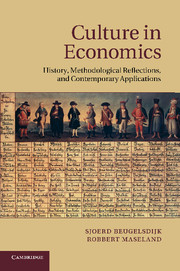Book contents
- Frontmatter
- Contents
- List of figures
- List of tables
- List of boxes
- Prologue
- Part I History and methodological reflections
- 1 Defining culture
- 2 How culture disappeared from economics
- 3 Explaining the rise of culture in modern economics
- 4 Culture in economics: contemporary theoretical perspectives
- 5 A methodological perspective on culture in economics
- Part II Contemporary applications
- Part III Evaluation
- References
- Index
3 - Explaining the rise of culture in modern economics
Published online by Cambridge University Press: 04 February 2011
- Frontmatter
- Contents
- List of figures
- List of tables
- List of boxes
- Prologue
- Part I History and methodological reflections
- 1 Defining culture
- 2 How culture disappeared from economics
- 3 Explaining the rise of culture in modern economics
- 4 Culture in economics: contemporary theoretical perspectives
- 5 A methodological perspective on culture in economics
- Part II Contemporary applications
- Part III Evaluation
- References
- Index
Summary
Introduction
Where the previous chapter told the story of culture's gradual disappearance from economics, this chapter tells the story of its comeback. As argued, by 1950 culture had all but disappeared from economics. This was the result of a long process in which culture and the economic had acquired almost opposite meanings.
The contrast between cultural and economic perspectives that came to characterize the state of thinking by 1950 is summarized in Table 3.1. In this list of oppositions, one can still recognize the distinction between culture and civilization as it emerged in the nineteenth century – economics inheriting the latter. Also, we see once again the various elements of the definition of culture discussed in Chapter 1. Culture, being about patterns of thought and behavior that are deemed inherited and unquestioned, is at odds with the economic model of the social as constituted by rational agents, purposively designing outcomes. Furthermore, culture focusses on collective, emergent properties, whereas economics looks at society from the perspective of individual behavior. Finally, the idea of cultural diversity inspiring different worldviews and patterns of behavior in different societies is alien to the economic quest for universal principles.
Given these rather fundamental oppositions, one would not expect culture to enter economic thought ever again. Yet, from the last decades of the twentieth century onwards, we can observe a steady rise of economic studies into culture, most of them applying quantitative methods to pin down the effects of cultural differences on economic outcomes (Barro and McCleary 2003; Fernandez 2007, 2008; Franke, Hofstede and Harris Bond 1991; Guiso, Sapienza and Zingales 2006, 2009; Granato, Inglehart and Leblang 1996; Harrison 1992; Luttmer and Singhal 2008; Noland 2005; Pryor 2005; Swank 1996; Tabellini 2007a, 2007b, to name a few).
- Type
- Chapter
- Information
- Culture in EconomicsHistory, Methodological Reflections and Contemporary Applications, pp. 60 - 84Publisher: Cambridge University PressPrint publication year: 2010



